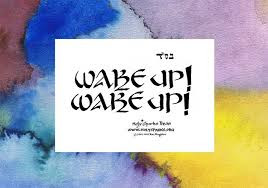Building a Strong Foundation
for the Days of Awe
Today's Elul Chai-Ku:
Ram's horn, blast your song!
Wake us! Wailing notes, pierce our haze.
Shofar, call us home.
Shofar, call us home.
Listen to the shofar blast here (click the arrow)!
2 Elul—The Shofar-You’re Being Called

It is customary during the month of Elul to hear the shofar everyday (with the exception of Shabbat), reminding us to continue our process of waking up. We wake up to a new year, to a clean slate, to new beginnings, to letting go of that which needs to be discarded.
 Elul is a liminal month, a month of transition. We return from our excursions of the past year and consider the journey ahead in the New Year. Elul is a time of unpacking, regrouping, and then saddling up for the year ahead.
Elul is a liminal month, a month of transition. We return from our excursions of the past year and consider the journey ahead in the New Year. Elul is a time of unpacking, regrouping, and then saddling up for the year ahead. This soul prep is hard work. It's much easier to laze and wander away from the discipline the Days of Awe require. But the renewal and growth offered from the high holy days are well worth the effort. Most of us will jump in unless we are cajoled a bit. We need a tangible call to action, or maybe even a startle to consciousness. The shofar, our ancient alarm clock, gives us this jolt.
The piercing sound of the shofar commands our attention, cutting through the haze of our complacency. The notes of the call are filled with intense longing and melancholy.
The four notes that are sounded during the Days of Awe actually tell the story of teshuva, of return. They remind us that part of the human condition is to go through constant cycles of wholeness and brokenness, integration and disintegration. No matter what has happened during the past year, the shofar reminds us, in the very sound and quality of the notes, that we can always return to wholeness,
to shalom.
TEKIYAH: One long blast. An integrated, full, whole sound. This sound calls to us first. We all start from a place of completeness, oneness.
SHEVARIM (literally translated as brokenness): Three medium blasts. At some point the integrated wholeness is broken. This is life. Clarity, bliss, focus is met with distraction. Peace and unity is inevitably broken.
TERUAH: Nine, staccato blasts. Then, there are times of extreme disturbance. Very little certainty or serenity. A major, trying life event. Even times of extreme joy and adventure have that staccato feel. This is the intense stimulation of living. Our attention is pulled this way and that. Our moments of integration are fewer. We need to feel the neutral security of tekiyah again.
 TEKIYAH GEDOLAH: One very, very long shofar blast. Return, teshuvah. We have come full circle. Another cycle of starting fresh. We leave Yom Kippur services with this reminder that what was broken has now been repaired. We are sent out on this positive affirmation through the triumphant sound of the shofar. Our Shevarims and Teruahs will inevitably greet us, but for now, we are whole. We have returned to our source.
TEKIYAH GEDOLAH: One very, very long shofar blast. Return, teshuvah. We have come full circle. Another cycle of starting fresh. We leave Yom Kippur services with this reminder that what was broken has now been repaired. We are sent out on this positive affirmation through the triumphant sound of the shofar. Our Shevarims and Teruahs will inevitably greet us, but for now, we are whole. We have returned to our source.or two.

Today’s Elul Tool: Listen to the four sounds of the shofar (in the audio file above). Hear the distinction between the long integrated blasts and the broken ones. Notice whatever reaction you have. Can you commit to listening to this shofar sound everyday of Elul. It doesn’t matter what time of day. If you forget, pick it up the next day. Don’t stop just because you skip a day.
It is customary to read Psalm 27 twice daily during Elul.
Here's an online version of Psalm 27 for easy access.













